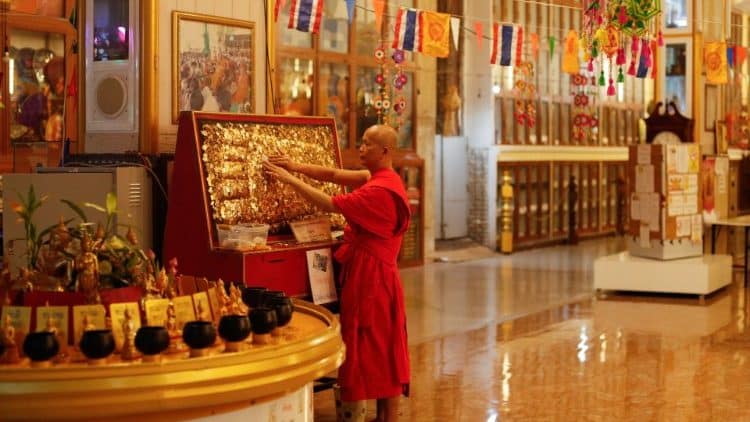On the occasion of the Buddhist Feast of Vesak, which commemorates the main events in the life of Buddha, the Dicastery for Interreligious Dialogue sends to Buddhists around the world a message of good wishes entitled: Buddhists and Christians: Healing the Wounds of Humanity and the Earth with Karuna and Agape.
We publish below the text of the Message, signed by the Prefect of the Dicastery, His Eminence Card. Miguel Ángel Ayuso Guixot, M.C.J., and the Secretary of the same Dicastery, Most Rev. Msgr. Indunil Janakaratne Kodithuwakku Kankanamalage:
Buddhists and Christians
Healing Wounded Humanity and the Earth through Karuna and Agape
Dear Buddhist Friends,
This Dicastery, formerly known as the Pontifical Council for Interreligious Dialogue, sends you its cordial greetings on the occasion of Vesak, a festive time in which you celebrate the birth, enlightenment and death of the Buddha. May this festival once more inspire you to continue your quest for insight into the nature of duhkha, the conditions that cause it, and how it can be overcome.
Life has its share of suffering and wounds, and festive occasions can provide needed distance from our everyday routine so as to approach them with renewed insight. Increased communication in today’s globalized world has made us aware that the problems we face are not isolated; they are the result of tensions and evils that entangle all of humanity. The wounds afflicting the world are many: poverty, discrimination and violence; indifference towards the poor, enslavement resulting from models of development that fail to respect the human person and nature; hate motivated and fueled by religious and nationalistic extremism; and above all, a despairing attitude towards life expressed through various types of anxiety and addiction. All these realities painfully expose our shared vulnerability.
The keen awareness of this shared vulnerability calls for new forms of solidarity shaped by our respective religious traditions, to which we look for “answers to the unsolved riddles of the human condition which deeply stir the hearts of men” (cf. Nostra Aetate 1). Because we are one human family, we are all related to one another as brothers and sisters, interdependent co-inhabitants of the earth. We are sailing in the same boat, “where one person’s problems are the problems of all. Once more, we realize that no one is saved alone; we can only be saved together” (Pope Francis, Fratelli Tutti, 32). This is why we consider it appropriate to recall the potential of our respective religious traditions to offer remedies capable of healing our grievous wounds, and those of our families, our nations, and our planet.
Dear Buddhist friends, you offer healing when you embody karuna – compassion towards all beings, taught by the Buddha (Sutta Nipata 1.8, Sutta Nipata 2.4) or when you act selflessly as did the Bodhisattva, who renounced entering Nirvana and remained in the world to work for the alleviation of the suffering of all beings until their liberation. The Buddha describes a person entirely informed by karuna: “He dwells with mind accompanied by compassion, suffusing one direction. Also, a second direction. Also, a third direction. Also, a fourth direction. Thus above, below, around, everywhere, identifying himself with all, he dwells suffusing the world of all (beings) with mind accompanied by compassion, extensive, sublime, unlimited, without enmity, without ill-will” (Abhidhamma Pitakaya Vibhanga b). Those who dwell with mind accompanied by compassion offer an antidote to the global crises we have mentioned, offering comprehensive compassion in response to widespread and interconnected evils.
Similarly, for Christians, there is no more effective remedy than the practice of agape (selfless love), the great legacy that Jesus left to his followers. Jesus gives his disciples the gift of divine love – agape – and teaches them to love one another (cf. John 15:13). He gives the example of a man who went out of his way to care for a stranger, an enemy of his people, who had fallen victim to robbers: “A Samaritan, as he journeyed, came to where he was; and when he saw him, he had compassion, and went to him and bound up his wounds, pouring on oil and wine; then he set him on his own beast and brought him to an inn, and took care of him” (Luke 10:33-34). The Samaritan demonstrates concrete closeness to the person in need.
I would like to reiterate the appeal of Pope Francis to serve others with compassion, to love concretely, not abstractly, with a love that “is grace, generosity, a desire to draw near, a love that does not hesitate to offer itself in sacrifice for the beloved. Charity, love, is sharing with the one we love in all things. Love makes us similar, it creates equality, it breaks down walls and eliminates distances” (Lenten Message 2014). Likewise, the Buddha’s emphasis on training the heart is especially valuable as we move forward together in our efforts to bring healing: “Develop meditation on compassion; for when you develop meditation on compassion, any cruelty will be abandoned” (Maharahulovada Sutta – MN 62).
May we all strive to live with greater love and compassion, and work together to build a more just, peaceful and united world. May you “radiate boundless love towards the entire world – above, below, and across – unhindered, without ill will, without enmity” (Karaniya Metta Sutta, Sn. 1.8). And may you enjoy, dear Buddhist brothers and sisters, abundant blessings and the joy of contributing to the healing of the wounds of society and the earth, our common home.
From the Vatican, 16 April 2023
Miguel Ángel Cardinal Ayuso Guixot, MCCJ
Prefect
Msgr. Indunil Janakaratne Kodithuwakku Kankanamalage
Secretary










